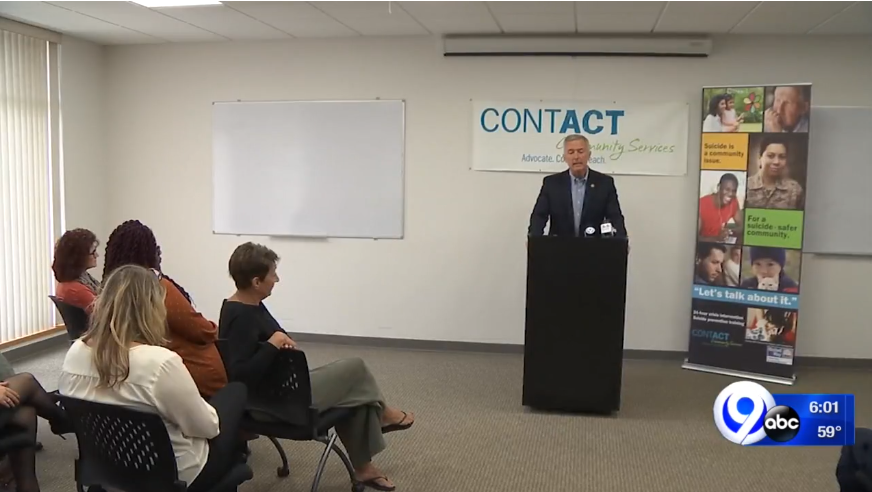New legislation could mean more funding for local crisis & suicide call centers
Originally posted on Newschannel 9/Local SYR
To watch, please visit: New legislation could mean more funding for local crisis & suicide call centers
 EAST SYRACUSE, N.Y. (WSYR-TV) – A proposed piece of legislation could bring a much-needed boost in federal funding to local crisis and suicide call centers across the country.
EAST SYRACUSE, N.Y. (WSYR-TV) – A proposed piece of legislation could bring a much-needed boost in federal funding to local crisis and suicide call centers across the country.The legislation co-sponsored by Congressman John Katko (R) seeks to increase a stipend provided to centers like Contact Community Services in East Syracuse by the federal government.
Speaking at a press conference Tuesday, Contact‘s Crisis Intervention Director Cheryl Giarrusso said the number of crisis and suicide calls has been steadily increasing.
act received 44,000 crisis calls in 2018, a spike from the previous year, which Giarrusso attributes to the deaths of Anthony Bordain and Kate Spade.
“We couldn’t manage nor could any other center in the country manage the spike in call volume and it has not abated since,” said Giarrusso.
Answering those calls cost Contact $150,000 dollars, but right now they and their more than 150 crisis call center counterparts across the country are only guarantee $2,500 dollars from the Substance Abuse and Mental Health Services Administration (SAMHSA).
Giarrusso said Contact does receive support from Onondaga County, but after that, funding isn’t guaranteed and requires applying for various grants and small contracts.
“You know you gotta start somewhere and I think this is a great place,” said Congressman Katko, adding like millions across the country, he too has been personally affected by suicide.
The proposed legislation calls for a funding increase of $38,000,000 dollars for the Suicide Prevention Lifeline.
- Current: $12,000,000
- Proposed: $50,000,000
Giarrusso said the majority of that increase would go directly to call centers like Contact.
If passed, the legislation would also require the U.S. Department of Health and Human Services (HHS) to implement a plan to increase quality assurance, eliminate call wait times, implement more follow-up practices, ensure resources for friends and family of those in crisis and create guidelines to carry out periodic testing of the Suicide Prevention Lifeline.
Other legislation highlights:
- Require increased coordination and data sharing between the Suicide Prevention Lifeline and the CDC
- Create a pilot program to research and employ innovative technologies for suicide prevention
- Require a study and report to Congress from both the HHS and U.S. Government Accountability Office on the plan to reform the Lifeline as well as other recommendations for improvement
“We often think it’s something that doesn’t affect us but if we really stop and look at our lives and who we know and who we touch it affects all of us,” said Giarrusso.
She added if the aid goes through Contact’s first priority would be to hire more staff to help more people in their time of need.
If you or someone you know is experiencing thoughts of suicide or another form of crisis the Suicide Prevention Lifeline is 1-800-273-8255.
